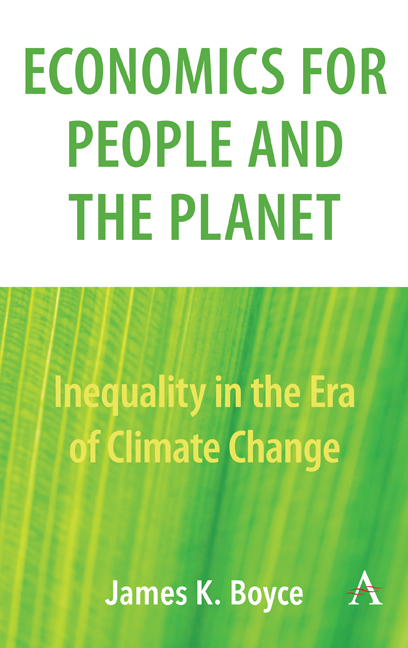Book contents
- Frontmatter
- Contents
- List of Illustrations
- Acknowledgements
- Part I Rethinking Economics and the Environment
- Part II Environmental Injustice
- Chapter 9 Inequality and the Environment
- Chapter 10 Clean Air for All
- Chapter 11 Letter from Flint
- Chapter 12 Let Them Drink Pollution?
- Chapter 13 Letter from Delhi
- Chapter 14 Mapping the Environmental Riskscape
- Chapter 15 Measuring Pollution Inequality
- Chapter 16 Cleaning the Air and Cooling the Planet
- Part III Climate Policy
- Notes
- Publication History
- Index
Chapter 9 - Inequality and the Environment
from Part II - Environmental Injustice
Published online by Cambridge University Press: 12 February 2019
- Frontmatter
- Contents
- List of Illustrations
- Acknowledgements
- Part I Rethinking Economics and the Environment
- Part II Environmental Injustice
- Chapter 9 Inequality and the Environment
- Chapter 10 Clean Air for All
- Chapter 11 Letter from Flint
- Chapter 12 Let Them Drink Pollution?
- Chapter 13 Letter from Delhi
- Chapter 14 Mapping the Environmental Riskscape
- Chapter 15 Measuring Pollution Inequality
- Chapter 16 Cleaning the Air and Cooling the Planet
- Part III Climate Policy
- Notes
- Publication History
- Index
Summary
Inequality in the distribution of wealth and power is both a cause and a consequence of environmental degradation.
Inequality as a Cause of Environmental Degradation
I began my career in the field of agricultural development. In the middle of my undergraduate studies I worked for two years in the Indian state of Bihar on a Gandhian land-reform project. A few years later, my partner Betsy Hartmann and I lived in a Bangladesh village with the aim of writing a book to address some basic questions that Westerners have about people in what used to be called the Third World. Questions like: What are the causes of poverty and hunger? What is the position of women? What's the role of religion? What's the impact of foreign aid? In our book, A Quiet Violence, we explored these issues through the stories of real people, as much as possible in their own words.
For me these were formative experiences. Living with some of the world's poorest people, and coming to see life through their eyes, profoundly shaped my understanding of the world and its problems. One of the most important lessons was about the debilitating effects of the unequal distribution of wealth and power. I came to understand the simple fact that the reason why hundreds of millions of people around the world went hungry, then and still today, is not because there's not enough food but because they lack the purchasing power to buy it in the market and the political power to obtain it by other means. The peasant farmers and agricultural labourers of Bangladesh and Bihar understood this clearly, even though it came as news to many economists a few years later when Amartya Sen published his landmark book, Poverty and Famines.
In South Asia I also began to recognize that inequality not only determines who eats and who starves, with results that can be tragic and obscene, but also constrains productivity, resulting a smaller economic pie than would exist in a more egalitarian and productive society–a result that can be termed the ‘inefficiency of inequality’.
When I entered graduate school at Oxford, a decade after having first set foot in Bihar, this was the topic I wanted to explore.
- Type
- Chapter
- Information
- Economics for People and the PlanetInequality in the Era of Climate Change, pp. 39 - 48Publisher: Anthem PressPrint publication year: 2019



